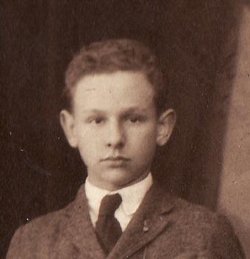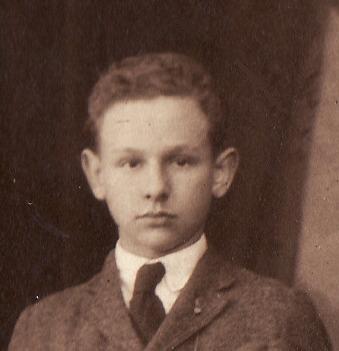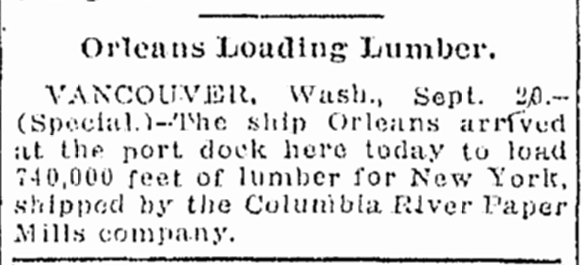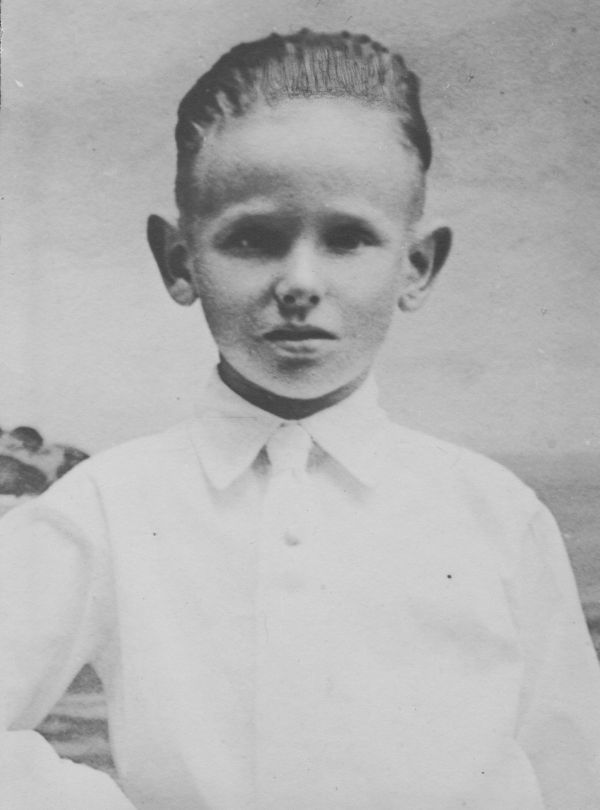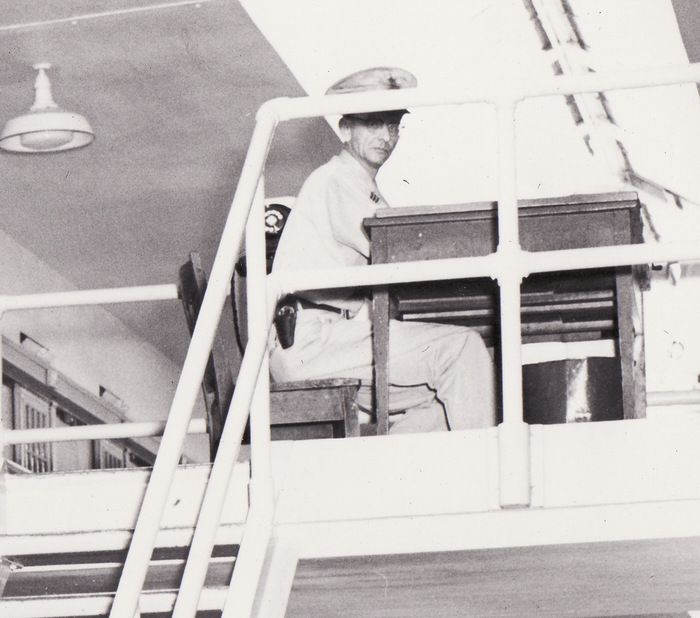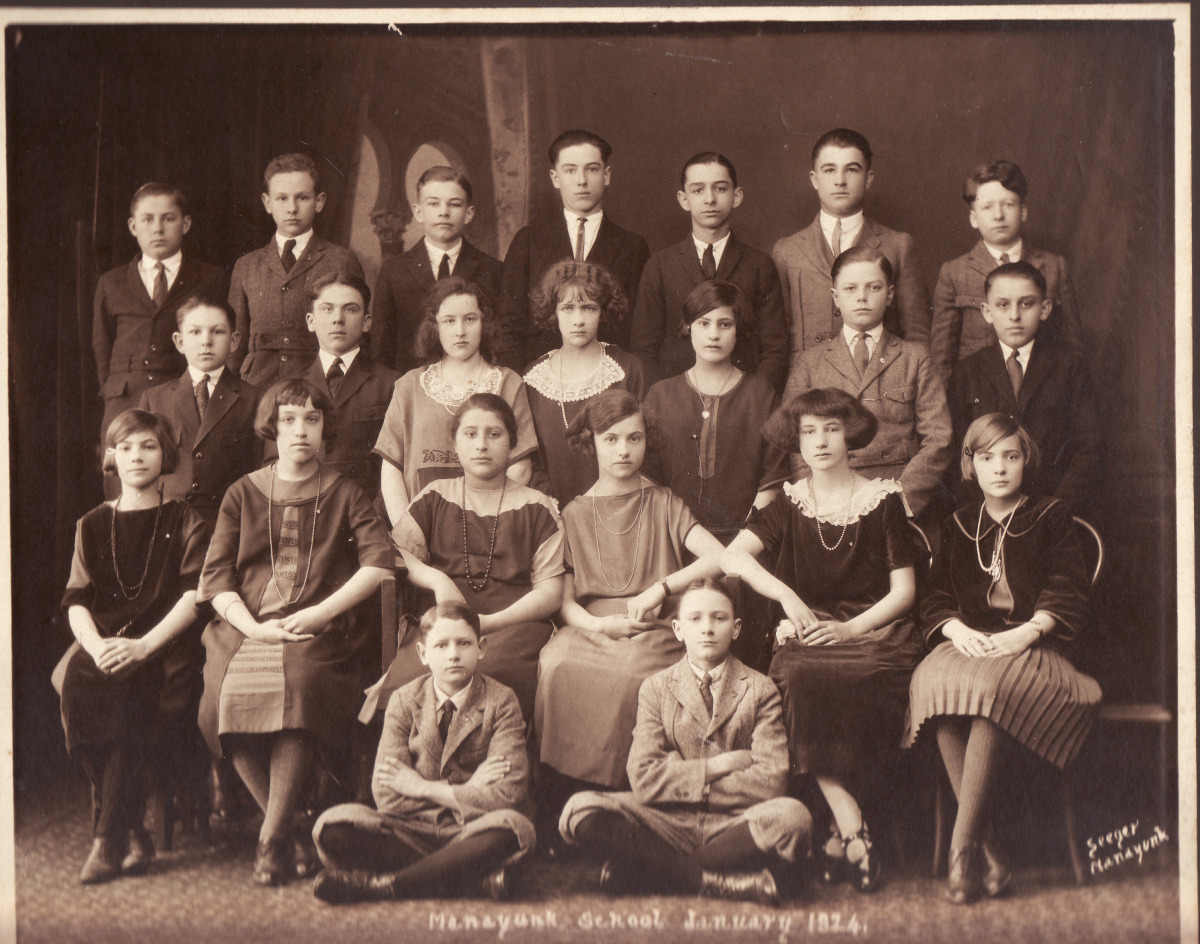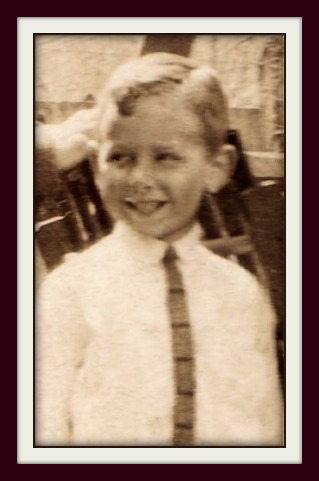He loved a good story, whether you were telling it or he was. I will remember him forever lighting his pungent pipe, his gentle teasing, his love of his Rottweiler Hildy (whom he called "my Bavarian dumpling"), his unassuming ways, his hushed breathless huffing, and soft, considered voice. The inmates at Graterford Prison, where he was Captain Storkey (called "Cap" by his co-workers) might remember him differently, but I was his grandchild and saw his finest side and kindest nature.
Even into old age, plagued with terrible eyesight and emphysema, he continued to ride his bicycle on Montgomery County's backroads, fished in the Perkiomen Creek, and persisted in chopping wood. He told tales of his young life, of lying about his age (at 15) so he could become a crew member on a ship which ultimately passed through the Panama Canal, and later joining the CCC (Civil Conservation Corps) and living in work camps during the Great Depression. Early in his young adult life he was employed by the Freas Glass Works in Conshohocken, and he and his wife and young family enjoyed living in the family's large white farmhouse on the Freas family grounds.
After this, he found his way professionally by working in the penal system. It is known he spent the bulk of his years at Graterford. His son recalls my grandpa saying he began at Graterford in 1944. One younger colleague remembers my grandpa as a Lieutenant at Graterford who counseled him on his first day in 1957, so clearly he'd taken the job by that time. Whatever the case, my grandpa spoke of intelligent, charming inmates on death row at Graterford, saying you'd never guess they were killers.
I will remember spending countless hours talking with him in his kitchen, in his home in the woods. There he fixed us brutal cups of "hobo coffee" (boil the grounds directly in the water, then strain it, a technique learned in the CCC forestry camp). He was partial to chicken croquettes and codfish cakes. He especially savored chocolate covered cherries, which I brought to him when visiting, and which I will impulse-buy to this day whenever I see them.
His mind was always active and sharp, and he loved reading history. When he finally became legally blind from glaucoma, he got lots of books on tape and enjoyed them by the hour. He loved music, and while not particular, he especially liked good orchestral renderings and bagpipes as well. He was proud of his Scottish heritage, and shared pieces of his memories with me. I have my notes from my talks with him, and keep trying to put the pieces together. It is full of funky fragments, like an Uncle Si Adair, who was supposedly the man or first circus performer to perfect the trick of standing on the backs of two horses running side by side. He told me stories of he and his father riding the trolley into center city Philadelphia to pay the mortgage. When the day was over and money was tight, they would have to make the critical decision: Enjoy pie at Linton's or take the trolley home? He said they usually ended up walking.
I can remember taking him out for a drive one lovely day to Manayunk where he'd grown up. We loaded him (and his oxygen tank) into my sad little first car (a Capri that I called "the Caprick" due to its nasty tendency to break down). We went through the row-homed area where he recalled his childhood, and then went on to the farmhouse where I was living at the time in Roxborough. He told me I was living near what was called "Murder Hollow" - a place where a family had been slaughtered -by axe- many years before- so long ago, in fact, that the story was old when he was a boy. He knew this because he'd slept there outside alone one night just to brag to his childhood friends he'd had the nerve to do it. I have since investigated this story and it is true; more info about it is at the very end of this memorial.
The Manayunk part of this outing took us through streets lined with tall thin rowhomes, where he grew up with his best buddy, "Reds" McMullen. I found Reds on my grandpa's school picture with this memorial, but beyond a few censuses, I had been unable to track his life and find what became of him, or find even an obituary.
In an amazingly fortuitous twist, about a year later in September of 2013, contributor Kenneth Gilbert wrote to me about this memorial, offering some assistance with church data, and in the course of writing, mentioned his cousin whose surname is McMullen. I took the shot and asked if his cousin's father might have been Reds. One thing led to another, and we were able to confirm the connection, and you may now see my grandpa's best childhood friend Sgt. William "Reds" McMullen. It made me feel good to find him, as an important part of my grandpa's life and a fondly recalled friend of his. I hope to learn more about Reds in time.
My grandpa's communication skills, to me, were intriguing. He had to have been tough enough to handle inmates, but probably he was different in personal conversation. It's a funny thing to remember, but bears noting - when speaking, he was a man who would pause. It was not for effect. He always spoke humbly and carefully, choosing words with consideration. Some people speak rapidly because they fear losing conversational control, or worry their listener might lose interest, but he had faith in you, and took his time. It was an indirect kindness.
His biological father is a question being worked on presently with DNA. Though I know it is not correct, his delayed birth certificate states that he was born at 3rd and West streets in Wilmington, Delaware, where his father worked as a ship riveter. He was an only child, raised by William Hamilton Storkey IV and Rosena Katterina Kimpel Storkey, his biological mother. He attended Northeast High School which was then called Northeast Manual Training School near 8th and Lehigh in Philadelphia, taking a drafting course with mathematics at a level which impressed my mathematically-inclined husband when he saw the school notes. (Was his going there influenced by the Gumphert family who was active and teaching there? His mother's half sister was Jane Gumphert Fullerton. Also, one of his instructors is here.)
Just before he turned 27, he married Dorothy Ida Jenkins Storkey on December 18, 1937 in the manse at the Presbyterian Church in Roxborough. When I received a copy of his marriage certificate, it showed he was married by Frank H. Rose (Minister of the Gospel). Pastor Rose is called elsewhere the Pastor of the "First Presbyterian Church in Manayunk", so the great "where does Manayunk end and Roxborough begin?" debate can rage on. But back to our subject... William was the father of a son and daughter, as well as two children who were stillborns or died young. His early married years were spent in his mother's home, and later at the Freas farm, but later he would build a house with his own hands at 280 Godshall Road in the Schwenksville/Collegeville area. It still stands, nestled in the trees on a pretty curve of the road, with a small creek out back.
William Hamilton Storkey V's immediate Philadelphia-area predecessors are buried in Leverington Cemetery, for which there's no office anymore. The grounds are next to the Roxborough Baptist Church at 6075 Ridge Avenue (Ridge and Lyceum), behind the diner.
Unlike them, however, he is not buried there. William Hamilton Storkey was cremated and his ashes scattered in the Sassafras River - Turner's Creek - in Maryland, with those of his daughter, Dorothy Joan Storkey who died after him. While he'd had bone cancer, his emphysema is what ultimately caught up to him.
He was a "leftie" forced in school to learn to write "rightie". Thankfully, despite his terrible handwriting, he was an excellent letter-writer, and we corresponded for years. Most of his letters were signed "With love from your late-blooming grandfather". I have only to pick up one of his missives to again hear his soft, huffy, singular voice. Only once did I ever hear him raise it. It was in his later years, and his dog Hildy (Hildegarde the Rottweiler) had taken the tip of his cane in her teeth and would not relent. "Dammit, dog, let go!" he boomed, in a voice I'd never heard before, and which let me know what the inmates heard if ever they got out of line.
______________________________________
William's last residence was in Schwenksville, Montgomery County, Pennsylvania where he passed at home with his wife and son present. He died of bone cancer which is not usually a swift disease. In March of 2010, I laid eyes on his death certificate for the first time. The certificate stated his primary cause of death was respiratory failure which had begun 1 week before his passing, and the secondary cause was bone metastases, onset 1 month before his death. So it seems his last sufferings thankfully had not lasted very long. Still, I will always be sorry not to have been there for him at his end.
I do remember once visiting him in a small private hospital well before he died. I was shown to his room, and blind as he was, he was in bed without his glasses and his eyes closed. I had not yet spoken when he said my name aloud and continued, "Dear, I knew you'd come."
Old school books of his from when he was age six reveal his early mind. In the margins, around the careful repetitive handwriting lessons ("The boy likes eggs, The boy likes eggs, The man sees a rat, The man sees a rat" etc) are his small doodles, many of which feature boats and ships, suggesting that even at that young age he was dreaming of his future nine years hence when he would work on a ship and see schools of porpoises and flying fish, turtles with shells two feet across and the Golden Gate Bridge. I like to picture him this way, content, on the water, and in a state of wonderment, his youthful eyes on the horizon.
_____________________________________
People often ask me if my search and reunion with birthfamily was "good". While not perfect, it was very worthwhile, and wonderful for many reasons, but my grandpa was the best reward at the end of a very frustrating journey.
I believe that the biggest reason some adopted people do not search for their birthfamilies is that they fear rejection. I know such fears slowed my search down too. How I wish I had known this one story.
One day my grandpa and his daughter were out walking together in the woods near his home. It was a lovely day, and they were simply present, not talking. Suddenly she said to him, referring to me, "You know, today's her tenth birthday." He answered with an anguished "I know!" and slammed his fist into a tree, breaking several bones.
When I finally heard this story post-reunion, it hurt a lot, yet it was important to hear. It hurt to know that both of them missed me ten years after my birth and relinquishment, but it was important to hear, to know I had been loved. I wish I had known all this back when I was a child, as it would have spared me many years of wondering and worry. I feel very blessed to have taken away my grandpa's worry by coming back alive and well, and hope I gave him at least half the pleasure and love he gave to me.
After spending many young years in the shadow of fear, certain I had not been thought of, loved or remembered, my life began again when I spoke to him on the telephone for the first time one autumn day. Not knowing if I had found the right family, and unsure how to ask, I had called under the guise of working on a friend's family tree. This kind and generous man went back and recited his genealogy as best he knew, going back to an Uncle Chris who had "come up from down south" with his muzzle loading musket. Then I asked about his immediate family and he named his children, one of whom had the name of my birthmother. That's when I knew I had the right family. I asked if his children had children and he told me their names and ages. I was swallowing hard, learning I had siblings. A terrible feeling was roiling inside me. I was already falling for this funny and sweet gent... he was my grandpa, and frankly I would have liked him anyway, but knowing who he was was shaking me very badly. Here he was, open and trusting and I was lying to him. I finally managed to stutter out "Did your daughter Joan also have a little girl on..." and I named my birthdate. Very nicely, but with a little finality he said "Oh, you've been very kind, but I'm afraid we don't talk about that." I did not know exactly what that meant. The not talking part was clear, but why? Did they want to forget? Did it hurt too badly to discuss? Was it too icky? Had they turned their backs? I did not know what to say. Finally I gulped, and this childish voice I did not know I possessed just managed to whisper "I'm her."
There was quite a pause. I was frightened that the next thing I would hear would be the sound of the phone being hung up. Then I heard him gasping. I did not know he had emphysema but clearly he was very upset. Had I hurt my own grandfather? Finally he found his voice, and I heard it gain in strength as he said, "Oh my God, oh my God, oh my God. How are you honey?" That is when my life began anew.
_____________________________________
Nautical odds and ends:
Some of my grandpa's old books that he gave me, like "Mariner's Handbook" (1918) and "The Merchant Marine Manual" (1906) have his name and address inside. It is probable he came by them used. One has the previous owner's name in it, and he was from Massachusetts. This makes it hard to understand how the book might have come into my grandpa's hands, and made me wonder if they'd met onboard the ship my grandpa took when 15. I tracked down the book's previous owner's son, who did not know if his father had gone on this particular trip, but did know his father had worked in the Merchant Marine many years and was indeed sailing in 1926 when my young grandpa was.
So it's not known when these books came into his possession, but his address was "244 Hermitage Street, Manayunk, Philadelphia". I do not know if his family owned or rented, nor if they occupied the whole home or part of it, which is sizable, about 2924 square feet by property records. The census records seem to indicate it was rented, and occupied by two families, one who ran a grocery store on the ground floor. Still, renting wouldn't work with the tale of taking the trolley to Philadelphia to pay the mortgage, so perhaps they later moved, or the mortgage was for a property his father once had in center city that contained a barroom. But checking on this old family home, I found city records stating it was built in 1900. At the turn of the century it was owned by William Ayres, a spinner. In 1965, it was the home of John Donovan, a member of the class of 1968 of the US Air Force Academy.
I have a copy of my grandpa's journal from when he made his big seafaring trip working aboard the ship Orleans which went south from Philadelphia, through the Panama Canal, and then north again to Vancouver, Washington. In September 2011 I found a short article (from The Oregonian) about the Orleans docking in Washington to pick up 740,000 feet of lumber, which exactly matches the date of arrival in grandpa's diary. Vancouver was a relatively new port back then, maybe 14 years old, and not as busy or deep as Portland, but the Columbia River Paper Mills were truly taking off in 1926 and thus drove the shipping at that port. As I research the ship and company, I've found it is possible my grandpa crossed paths with Warren Addison Barnum who was dock superintendent for the Columbia River Paper Mills, from whence the ship Orleans got its lumber.
Young and alone, he must have had some quiet daring to have taken on that journey and the work that came with it. He never named his job title, but it seems to have involved a lot of cleaning, brass polishing, and serving of coffee, tea, and meals, steward duties. He was tall and slim and not much of a talker, perhaps he seemed to be the 17 year old he claimed to be and not the 15 year old he was.
My grandpa suffered terribly from seasickness his first days, usually losing his breakfast but keeping down his dinners. He was only two days into his journey when the second engineer "Sparks" mentioned to him that Rudy Valentino had died. He also worked alongside "Shorty" the second cook and Tom another cook, third officer Mr. Curry, first mate Mr. Williams, Mr. Hart, and "Salty" a young fellow on watch who promised to teach him the wheel.
His journal is written rather matter of factly, only confessing his feelings of homesickness once when talking of watching the sea and the stars in the evening: "I would have wished myself home long ago if not for the wonderful nights. They alone are worth the trip." He saw the coasts of San Salvador, Cuba and Central America, and went through the Panama Canal where he saw crocodiles at night, and slept on deck on the hotter nights. He recounts a steward who drank too much while ashore at the canal, missing the ship, but catching up with it at the locks, in his hands a bottle and a pup that was dubbed a Mexican Crab Hound. When he himself went ashore, he indulged his interest in movies, seeing "Ranson's Folly" in San Francisco and "Three Bad Men" in Portland. Near the halfway point, he must have felt especially far from home. He sat in a barber's chair in Aberdeen, Washington getting an overpriced 65 cent haircut, while hearing the broadcast of a boxing match from his hometown of Philadelphia... ten rounds of Tunney defeating Dempsey in the pouring rain. Besides seeing shows while docked, he spent money on fishing gear and landed a two foot carp in Vancouver. It was a full and exciting life for a boy of 15; he can be forgiven for abandoning his journal halfway through the voyage. Why describe it when you can live it?
And Murder Hollow? The frightening story was very true, and well-documented by newspapers of the time. A pregnant mother, her husband, and their one year old child were all killed on May 3, 1851. The tale was still a spooky local legend when my grandpa slept in Murder Hollow as a young boy, about 70 years after the axe fell.
He loved a good story, whether you were telling it or he was. I will remember him forever lighting his pungent pipe, his gentle teasing, his love of his Rottweiler Hildy (whom he called "my Bavarian dumpling"), his unassuming ways, his hushed breathless huffing, and soft, considered voice. The inmates at Graterford Prison, where he was Captain Storkey (called "Cap" by his co-workers) might remember him differently, but I was his grandchild and saw his finest side and kindest nature.
Even into old age, plagued with terrible eyesight and emphysema, he continued to ride his bicycle on Montgomery County's backroads, fished in the Perkiomen Creek, and persisted in chopping wood. He told tales of his young life, of lying about his age (at 15) so he could become a crew member on a ship which ultimately passed through the Panama Canal, and later joining the CCC (Civil Conservation Corps) and living in work camps during the Great Depression. Early in his young adult life he was employed by the Freas Glass Works in Conshohocken, and he and his wife and young family enjoyed living in the family's large white farmhouse on the Freas family grounds.
After this, he found his way professionally by working in the penal system. It is known he spent the bulk of his years at Graterford. His son recalls my grandpa saying he began at Graterford in 1944. One younger colleague remembers my grandpa as a Lieutenant at Graterford who counseled him on his first day in 1957, so clearly he'd taken the job by that time. Whatever the case, my grandpa spoke of intelligent, charming inmates on death row at Graterford, saying you'd never guess they were killers.
I will remember spending countless hours talking with him in his kitchen, in his home in the woods. There he fixed us brutal cups of "hobo coffee" (boil the grounds directly in the water, then strain it, a technique learned in the CCC forestry camp). He was partial to chicken croquettes and codfish cakes. He especially savored chocolate covered cherries, which I brought to him when visiting, and which I will impulse-buy to this day whenever I see them.
His mind was always active and sharp, and he loved reading history. When he finally became legally blind from glaucoma, he got lots of books on tape and enjoyed them by the hour. He loved music, and while not particular, he especially liked good orchestral renderings and bagpipes as well. He was proud of his Scottish heritage, and shared pieces of his memories with me. I have my notes from my talks with him, and keep trying to put the pieces together. It is full of funky fragments, like an Uncle Si Adair, who was supposedly the man or first circus performer to perfect the trick of standing on the backs of two horses running side by side. He told me stories of he and his father riding the trolley into center city Philadelphia to pay the mortgage. When the day was over and money was tight, they would have to make the critical decision: Enjoy pie at Linton's or take the trolley home? He said they usually ended up walking.
I can remember taking him out for a drive one lovely day to Manayunk where he'd grown up. We loaded him (and his oxygen tank) into my sad little first car (a Capri that I called "the Caprick" due to its nasty tendency to break down). We went through the row-homed area where he recalled his childhood, and then went on to the farmhouse where I was living at the time in Roxborough. He told me I was living near what was called "Murder Hollow" - a place where a family had been slaughtered -by axe- many years before- so long ago, in fact, that the story was old when he was a boy. He knew this because he'd slept there outside alone one night just to brag to his childhood friends he'd had the nerve to do it. I have since investigated this story and it is true; more info about it is at the very end of this memorial.
The Manayunk part of this outing took us through streets lined with tall thin rowhomes, where he grew up with his best buddy, "Reds" McMullen. I found Reds on my grandpa's school picture with this memorial, but beyond a few censuses, I had been unable to track his life and find what became of him, or find even an obituary.
In an amazingly fortuitous twist, about a year later in September of 2013, contributor Kenneth Gilbert wrote to me about this memorial, offering some assistance with church data, and in the course of writing, mentioned his cousin whose surname is McMullen. I took the shot and asked if his cousin's father might have been Reds. One thing led to another, and we were able to confirm the connection, and you may now see my grandpa's best childhood friend Sgt. William "Reds" McMullen. It made me feel good to find him, as an important part of my grandpa's life and a fondly recalled friend of his. I hope to learn more about Reds in time.
My grandpa's communication skills, to me, were intriguing. He had to have been tough enough to handle inmates, but probably he was different in personal conversation. It's a funny thing to remember, but bears noting - when speaking, he was a man who would pause. It was not for effect. He always spoke humbly and carefully, choosing words with consideration. Some people speak rapidly because they fear losing conversational control, or worry their listener might lose interest, but he had faith in you, and took his time. It was an indirect kindness.
His biological father is a question being worked on presently with DNA. Though I know it is not correct, his delayed birth certificate states that he was born at 3rd and West streets in Wilmington, Delaware, where his father worked as a ship riveter. He was an only child, raised by William Hamilton Storkey IV and Rosena Katterina Kimpel Storkey, his biological mother. He attended Northeast High School which was then called Northeast Manual Training School near 8th and Lehigh in Philadelphia, taking a drafting course with mathematics at a level which impressed my mathematically-inclined husband when he saw the school notes. (Was his going there influenced by the Gumphert family who was active and teaching there? His mother's half sister was Jane Gumphert Fullerton. Also, one of his instructors is here.)
Just before he turned 27, he married Dorothy Ida Jenkins Storkey on December 18, 1937 in the manse at the Presbyterian Church in Roxborough. When I received a copy of his marriage certificate, it showed he was married by Frank H. Rose (Minister of the Gospel). Pastor Rose is called elsewhere the Pastor of the "First Presbyterian Church in Manayunk", so the great "where does Manayunk end and Roxborough begin?" debate can rage on. But back to our subject... William was the father of a son and daughter, as well as two children who were stillborns or died young. His early married years were spent in his mother's home, and later at the Freas farm, but later he would build a house with his own hands at 280 Godshall Road in the Schwenksville/Collegeville area. It still stands, nestled in the trees on a pretty curve of the road, with a small creek out back.
William Hamilton Storkey V's immediate Philadelphia-area predecessors are buried in Leverington Cemetery, for which there's no office anymore. The grounds are next to the Roxborough Baptist Church at 6075 Ridge Avenue (Ridge and Lyceum), behind the diner.
Unlike them, however, he is not buried there. William Hamilton Storkey was cremated and his ashes scattered in the Sassafras River - Turner's Creek - in Maryland, with those of his daughter, Dorothy Joan Storkey who died after him. While he'd had bone cancer, his emphysema is what ultimately caught up to him.
He was a "leftie" forced in school to learn to write "rightie". Thankfully, despite his terrible handwriting, he was an excellent letter-writer, and we corresponded for years. Most of his letters were signed "With love from your late-blooming grandfather". I have only to pick up one of his missives to again hear his soft, huffy, singular voice. Only once did I ever hear him raise it. It was in his later years, and his dog Hildy (Hildegarde the Rottweiler) had taken the tip of his cane in her teeth and would not relent. "Dammit, dog, let go!" he boomed, in a voice I'd never heard before, and which let me know what the inmates heard if ever they got out of line.
______________________________________
William's last residence was in Schwenksville, Montgomery County, Pennsylvania where he passed at home with his wife and son present. He died of bone cancer which is not usually a swift disease. In March of 2010, I laid eyes on his death certificate for the first time. The certificate stated his primary cause of death was respiratory failure which had begun 1 week before his passing, and the secondary cause was bone metastases, onset 1 month before his death. So it seems his last sufferings thankfully had not lasted very long. Still, I will always be sorry not to have been there for him at his end.
I do remember once visiting him in a small private hospital well before he died. I was shown to his room, and blind as he was, he was in bed without his glasses and his eyes closed. I had not yet spoken when he said my name aloud and continued, "Dear, I knew you'd come."
Old school books of his from when he was age six reveal his early mind. In the margins, around the careful repetitive handwriting lessons ("The boy likes eggs, The boy likes eggs, The man sees a rat, The man sees a rat" etc) are his small doodles, many of which feature boats and ships, suggesting that even at that young age he was dreaming of his future nine years hence when he would work on a ship and see schools of porpoises and flying fish, turtles with shells two feet across and the Golden Gate Bridge. I like to picture him this way, content, on the water, and in a state of wonderment, his youthful eyes on the horizon.
_____________________________________
People often ask me if my search and reunion with birthfamily was "good". While not perfect, it was very worthwhile, and wonderful for many reasons, but my grandpa was the best reward at the end of a very frustrating journey.
I believe that the biggest reason some adopted people do not search for their birthfamilies is that they fear rejection. I know such fears slowed my search down too. How I wish I had known this one story.
One day my grandpa and his daughter were out walking together in the woods near his home. It was a lovely day, and they were simply present, not talking. Suddenly she said to him, referring to me, "You know, today's her tenth birthday." He answered with an anguished "I know!" and slammed his fist into a tree, breaking several bones.
When I finally heard this story post-reunion, it hurt a lot, yet it was important to hear. It hurt to know that both of them missed me ten years after my birth and relinquishment, but it was important to hear, to know I had been loved. I wish I had known all this back when I was a child, as it would have spared me many years of wondering and worry. I feel very blessed to have taken away my grandpa's worry by coming back alive and well, and hope I gave him at least half the pleasure and love he gave to me.
After spending many young years in the shadow of fear, certain I had not been thought of, loved or remembered, my life began again when I spoke to him on the telephone for the first time one autumn day. Not knowing if I had found the right family, and unsure how to ask, I had called under the guise of working on a friend's family tree. This kind and generous man went back and recited his genealogy as best he knew, going back to an Uncle Chris who had "come up from down south" with his muzzle loading musket. Then I asked about his immediate family and he named his children, one of whom had the name of my birthmother. That's when I knew I had the right family. I asked if his children had children and he told me their names and ages. I was swallowing hard, learning I had siblings. A terrible feeling was roiling inside me. I was already falling for this funny and sweet gent... he was my grandpa, and frankly I would have liked him anyway, but knowing who he was was shaking me very badly. Here he was, open and trusting and I was lying to him. I finally managed to stutter out "Did your daughter Joan also have a little girl on..." and I named my birthdate. Very nicely, but with a little finality he said "Oh, you've been very kind, but I'm afraid we don't talk about that." I did not know exactly what that meant. The not talking part was clear, but why? Did they want to forget? Did it hurt too badly to discuss? Was it too icky? Had they turned their backs? I did not know what to say. Finally I gulped, and this childish voice I did not know I possessed just managed to whisper "I'm her."
There was quite a pause. I was frightened that the next thing I would hear would be the sound of the phone being hung up. Then I heard him gasping. I did not know he had emphysema but clearly he was very upset. Had I hurt my own grandfather? Finally he found his voice, and I heard it gain in strength as he said, "Oh my God, oh my God, oh my God. How are you honey?" That is when my life began anew.
_____________________________________
Nautical odds and ends:
Some of my grandpa's old books that he gave me, like "Mariner's Handbook" (1918) and "The Merchant Marine Manual" (1906) have his name and address inside. It is probable he came by them used. One has the previous owner's name in it, and he was from Massachusetts. This makes it hard to understand how the book might have come into my grandpa's hands, and made me wonder if they'd met onboard the ship my grandpa took when 15. I tracked down the book's previous owner's son, who did not know if his father had gone on this particular trip, but did know his father had worked in the Merchant Marine many years and was indeed sailing in 1926 when my young grandpa was.
So it's not known when these books came into his possession, but his address was "244 Hermitage Street, Manayunk, Philadelphia". I do not know if his family owned or rented, nor if they occupied the whole home or part of it, which is sizable, about 2924 square feet by property records. The census records seem to indicate it was rented, and occupied by two families, one who ran a grocery store on the ground floor. Still, renting wouldn't work with the tale of taking the trolley to Philadelphia to pay the mortgage, so perhaps they later moved, or the mortgage was for a property his father once had in center city that contained a barroom. But checking on this old family home, I found city records stating it was built in 1900. At the turn of the century it was owned by William Ayres, a spinner. In 1965, it was the home of John Donovan, a member of the class of 1968 of the US Air Force Academy.
I have a copy of my grandpa's journal from when he made his big seafaring trip working aboard the ship Orleans which went south from Philadelphia, through the Panama Canal, and then north again to Vancouver, Washington. In September 2011 I found a short article (from The Oregonian) about the Orleans docking in Washington to pick up 740,000 feet of lumber, which exactly matches the date of arrival in grandpa's diary. Vancouver was a relatively new port back then, maybe 14 years old, and not as busy or deep as Portland, but the Columbia River Paper Mills were truly taking off in 1926 and thus drove the shipping at that port. As I research the ship and company, I've found it is possible my grandpa crossed paths with Warren Addison Barnum who was dock superintendent for the Columbia River Paper Mills, from whence the ship Orleans got its lumber.
Young and alone, he must have had some quiet daring to have taken on that journey and the work that came with it. He never named his job title, but it seems to have involved a lot of cleaning, brass polishing, and serving of coffee, tea, and meals, steward duties. He was tall and slim and not much of a talker, perhaps he seemed to be the 17 year old he claimed to be and not the 15 year old he was.
My grandpa suffered terribly from seasickness his first days, usually losing his breakfast but keeping down his dinners. He was only two days into his journey when the second engineer "Sparks" mentioned to him that Rudy Valentino had died. He also worked alongside "Shorty" the second cook and Tom another cook, third officer Mr. Curry, first mate Mr. Williams, Mr. Hart, and "Salty" a young fellow on watch who promised to teach him the wheel.
His journal is written rather matter of factly, only confessing his feelings of homesickness once when talking of watching the sea and the stars in the evening: "I would have wished myself home long ago if not for the wonderful nights. They alone are worth the trip." He saw the coasts of San Salvador, Cuba and Central America, and went through the Panama Canal where he saw crocodiles at night, and slept on deck on the hotter nights. He recounts a steward who drank too much while ashore at the canal, missing the ship, but catching up with it at the locks, in his hands a bottle and a pup that was dubbed a Mexican Crab Hound. When he himself went ashore, he indulged his interest in movies, seeing "Ranson's Folly" in San Francisco and "Three Bad Men" in Portland. Near the halfway point, he must have felt especially far from home. He sat in a barber's chair in Aberdeen, Washington getting an overpriced 65 cent haircut, while hearing the broadcast of a boxing match from his hometown of Philadelphia... ten rounds of Tunney defeating Dempsey in the pouring rain. Besides seeing shows while docked, he spent money on fishing gear and landed a two foot carp in Vancouver. It was a full and exciting life for a boy of 15; he can be forgiven for abandoning his journal halfway through the voyage. Why describe it when you can live it?
And Murder Hollow? The frightening story was very true, and well-documented by newspapers of the time. A pregnant mother, her husband, and their one year old child were all killed on May 3, 1851. The tale was still a spooky local legend when my grandpa slept in Murder Hollow as a young boy, about 70 years after the axe fell.
